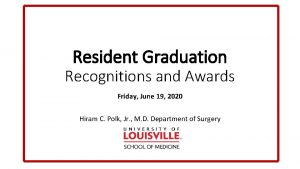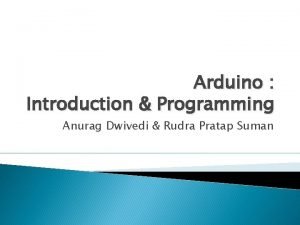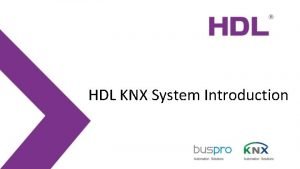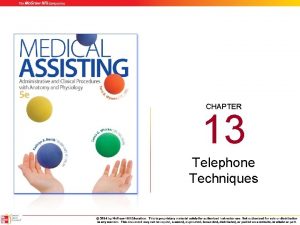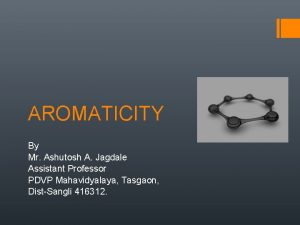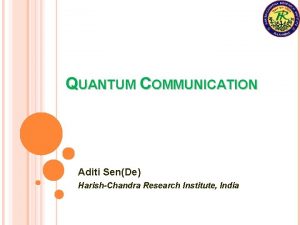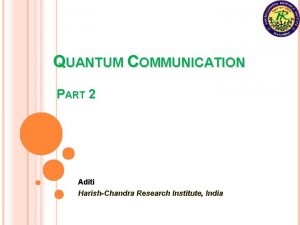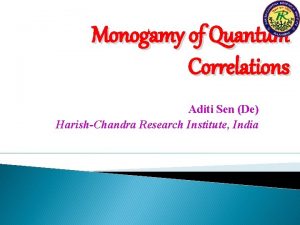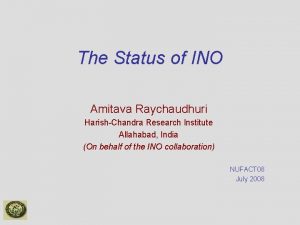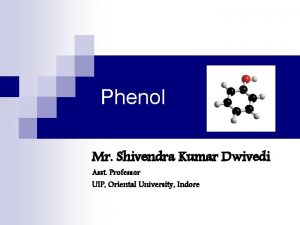Dr Ashutosh Dwivedi Assistant Professor Harishchandra P G










- Slides: 10

Dr. Ashutosh Dwivedi Assistant Professor Harishchandra P. G. college

Neurophysiological And Bio-Chemical Basis Of Memory Topic related to MA 2 nd (SEM) Paper-4 (Unit-4)- Psychobiology Of Motivation Learning And Memory

Neurophysiological Basis Of Memory Can we pinpoint a location in the brain where memories storage? Is there a single site that corresponds to a particular memory, or is memory distributed in different in regions across the brain? The search for the engram, the term for the physical memory trace that corresponds to a memory, has proved to be a major puzzle to psychologists interested in memory. Investigators have learned that certain areas and structure of the brain specialise in different types of memory-related activities.

By leison technique Neurologists and psychologists have been suggested that: Amigdala, Cortex, are play key role in memory Amigdala- Main function of Amigdala is regulate emotions, such as fear and aggression. Amigdala playa a part in how memories are stored because storage is influence by stress hormones.

Hippocampus- ( Clark, Zola, & Squire, 2000) conduct a study upon rats, for seeing that how hippocampus functions in memory processing. After lession the hippocampus of the rats they found that rats demonstrated memory impairment On various tasks, such as object recognition and maze running. They concluded that the hippocampus is involved in memory. Another role of hippocampus is to project information to cortical regions that give memories meaning and connect them with other connected memories.

Cerebellum- Although hippocampus seems to processing for explicit memory, if we could still lose it and be able to create implicit memory( procedural memory, motor learning and classical conditioning) Steinmetz, 1999; Green & Woodruff-Park, 2000), done a study and the outcomes was: after damaging cerebellum rabbits were not able to learn the conditioned eye- blink response. Prefrontalcortex- If we think that how memories processing and retain information, then it’s matter of prefrontal cortex.

( Kapur et al; 1994) preside over a study. In which participants had to complete two different tasks: either looking for the letter in words or non-living. Recall was much better for the semantic task than for the perceptual task. When we see PET scan of the brain, there was much more activation in the left inferior prefrontal cortex.

Bio- Chemical Basis Of Memory Protein Synthesis- Importance of protein synthesis in cellular regulatory process, it has along with memory in some way. Protein synthesis is inhibited by 90 -95% Just before or after training in a simple task, within few hours. When inhibition is established 30 min Or longer memory is not affected. After using drug that inhibit protein synthesis, the result have generally been taken to mean that brain protein synthesis during or shortly after training is required for the formation of the LTM.

Cholinergic Hypothesis. Cholinergic neurones of the central nervous system play an important role in learning or memory has been stimulated by two key observations. First, patients with Alzheimer’s disease sustain severe losses of cortical choline acetyltransferase (CHAT). (Brown et al; 1976) Which correlate with the severity of their cognitive deficits. Second, Alzheimer’s disease is associated with cell loss. Such reports of cholinergic deterioration have stimulated many different types of research and have fostered the hypothesis that “ These disturbances play an important role in the memory loss and related cognitive problems associated with old age and dementia. . . ” ( Bartus et al, 1984)

THANK YOU


